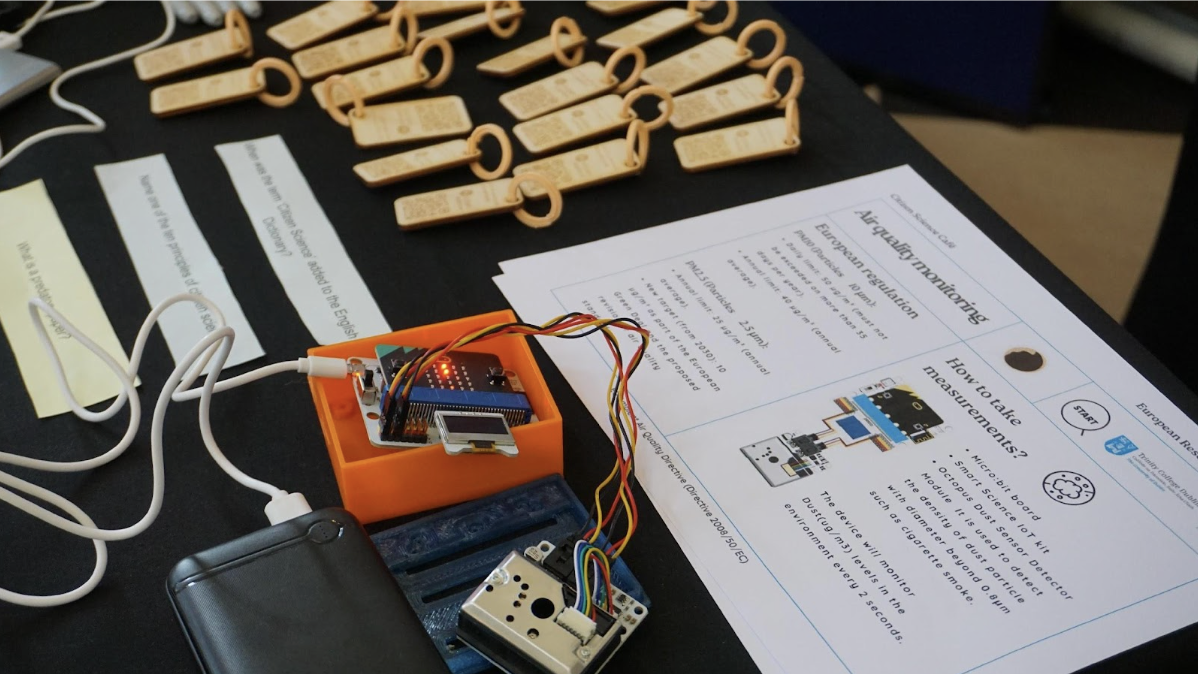
Building a collaborative future for citizen science in Ireland: Stories from an ECS Ambassador-led partnership
Natalie
Oct. 15, 2025, 11 a.m.
Most scientific research efforts have started with a simple moment of curiosity — people considering alternative ways to perform everyday tasks or address modern problems. As today’s world grows increasingly complex, science has a much greater need for curious minds and the intertwinement of new perspectives, and recent growths in citizen science projects have helped to fill that gap. As people working beyond traditional academic settings collaborate on and create research projects, new scientific findings can have greater impacts on both public perceptions of science, and on positive societal development .
Makerspaces often serve as experimental hubs for people’s unique ideas to intersect with established research projects. Oscar Diaz serves as the Operations and Education Manager at Creative Spark Enterprise FabLab in Dundalk, Ireland. In this space, he’s spearheaded countless creative workshops and programmes, collaborating with students, businesses, and community stakeholders. More recently, he has stepped into another related role: the European Citizen Science (ECS) Irish Ambassador. Although the duties under this title place more emphasis on science engagement and raising awareness about current research, he identifies key similarities between the two. “Creative spaces like fablabs, makerspaces and hackerspaces naturally attract curious, motivated people who want to tackle real-world issues, and I saw a huge opportunity to connect that energy with scientific research.”
As he’s gained experience as an ESC Ambassador, Oscar has discovered how collaborations between ambassadors and project partners like Creative Spark have been incredibly beneficial for his work with the public. “Working with scientists and communicators has allowed us to break down barriers between experts and the public, co-create solutions to local challenges, and empower individuals to contribute meaningfully to research. It’s incredibly rewarding to see people realise that science is something they can actively participate in, not just observe from the sidelines.”
What’s more interesting is that these kinds of partnerships are also benefitting citizen science project managers who primarily work in academia. Aoife Taylor, a collaborator with the ECS initiative based in Trinity College Dublin’s Science & Society Research Group, deeply values the perspectives that Oscar’s work brings to the table. “It has not only influenced the design and aims of our activities but also prompted us to rethink our own role in the establishment of a citizen science network,” she says. “It’s very easy to fall into a narrow perspective based on your own circles of influence. By expanding outside of these, and developing truly reciprocal relationships, you can create much more inclusive, equitable and meaningful activities.”
And people working in makerspaces have reciprocated this sentiment — Oscar is proud of how much Creative Spark has grown since partnering with ECS. “It’s given us platforms for knowledge exchange and collaboration, and it’s linked Creative Spark to a broader European community of citizen science practitioners. Through the network, we’ve formed partnerships with universities, NGOs, and other makerspaces, and we’ve benefited from training and shared resources that support both staff and volunteers. These connections have helped Creative Spark stay at the forefront of citizen science innovation, and they ensure that our local efforts are part of a much larger movement across Europe.”
Yet these benefits not only provide an immediate impact on public engagement with science through events and workshops. Both Oscar and Aoife envision long-lasting improvements to the quality and accessibility of citizen science projects in Ireland by nature of this collaboration. “Looking ahead, I see citizen science partnerships in Ireland becoming more inclusive, engaging a wider range of communities, and making a special focus on the co-creation part of citizen science and voices in research and innovation. Technology will continue to play a big role, empowering more people to participate and expanding the impact of citizen science. The foundations we’re building now—through networks like ECS and collaborations with institutions like Trinity College Dublin—will help ensure that citizen science continues to grow as a force for positive change in Ireland.”
However, none of these changes will come without improvements to the existing context of citizen science in Ireland. Aoife Taylor discusses the connections between researchers, local stakeholders like the FabLab, and governments, noting that “support of the citizen science community as a whole also needs to come from a policy perspective, where projects can impact real change in the local areas in which they aim to support.”
Integrating the diverse practices of these different groups has been exciting for ECS Ambassadors like Oscar, but he also recognizes the key position of citizens themselves in science projects as well. “It’s also important to make sure that community voices remain central when collaborating on a larger scale and to prioritise a bottom-up approach.”
Looking towards the future, those involved with citizen science feel that collaborations like these will contribute to those desired outcomes. “I hope to see a more connected citizen science community in Ireland, where collaborative, reciprocal and transdisciplinary initiatives thrive,” Aoife Taylor says. “I would also like to see more bottom – up citizen science activities, led by community groups and supported by those who can provide particular skills and resources beneficial to the project, such as universities. Through the establishment of a strong network, such partnerships should be possible.”
Author: Natalie Gildea
Editor: Aoife Taylor (and a special thanks to Oscar Diaz for his helpful contributions to this piece.)
Image credits: Oscar Diaz